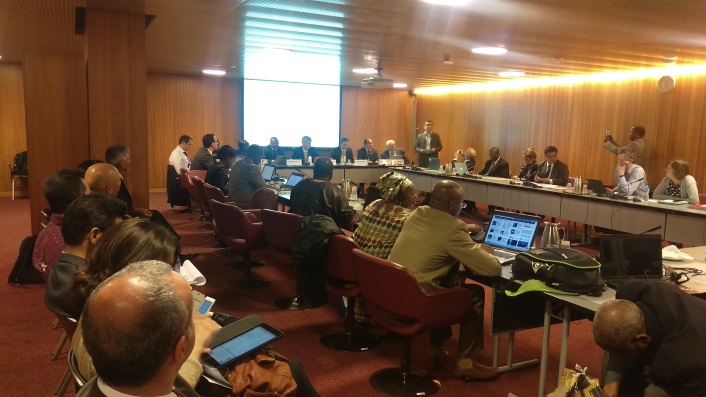Ban-Minamata Side Event at the Conferences of the Parties to the Basel, Rotterdam and Stockholm Conventions
11 May 2015, Geveva, Switzerland - In the context of the Conferences of the Parties to the Basel, Rotterdam and Stockholm Conventions (BRS COPs), UNITAR, the BRS secretariat and the Interim Secretariat of the Minamata Convention collaborated to host a side event:
“Ratification and Early Implementation of the Minamata Convention and of Basel Convention Ban Amendment: Opportunities for efficient and effective actions” 
With such a focus in mind, panellists came from Côte d'Ivoire, Senegal, Zambia, Switzerland, the BRS secretariat, the Interim Secretariat of the Minamata Convention and UNITAR.
Rolph Payet, Executive Secretary of the BRS Conventions, concentrated on the secretariat’s experiences in assisting Parties facing difficulties ratifying the Ban Amendment. He reiterated the call from the Conference of the Parties encouraging Parties to ratify the Amendment. Praising the progress made since 2013, with 6 new ratifications, he noted in particular that only 12 more ratifications were needed from those that were Parties at the time the amendment was adopted for it to enter into force, further serving as a tool to enhance sound management of chemicals globally.
Jacob Duer, coordinator of the Interim Secretariat of the Minamata Convention, reflected on how the Minamata and the Ban Amendment ratification processes may be advanced further and build upon already well-established chemicals and waste platforms. Drawing on experiences shared by countries and stakeholders at a recent series of workshops on the Minamata Convention, he highlighted some of these benefits, and encouraged participants also to consider the broader context of the newly established Special Programme to support institutional strengthening at the national level.
Luca Arnold, of Switzerland, started with the theme of 2013 COPs (“Synergies deliver!”), emphasising that there are many benefits to be had by using systems and processes in place for previous ratifications, echoing the comments by Messrs. Payet and Duer.
John Haines, on behalf of UNITAR, presented on UNITAR’s support work it undertakes in the ratification processes, and underlined some of the potential areas for effective actions: analysis of legal steps, analysis of socio-economic implications, technical studies and collecting data, preparation of texts, forming and undertaking workshops, and developing final reports.
Country experiences
Aita Seck from the Ministry of Environment in Senegal presented the recent projects on the Minamata Convention and Basel Ban amendment that were run concurrently, with coordination across the two projects and support from UNITAR. They were able to have a coordinated steering committee across the two projects and combine initial and final workshops.
Florent Botto from the Ministry of Environment of Côte d'Ivoire presented on the opportunities they see as available as they undertake further ratification processes, noting that the key actors are almost identical and that the same approach can be taken: coordination of actions, engagement of actors and undertaking studies on the implications of ratification.
David Kapindula from the Environmental Management Agency of Zambia followed this with a complementary message, noting that the systems and actors are very similar across the ratification processes. He also provided a brief overview of the ratification process in the country and the national situation concerning mercury management
Floor participants also shared their experiences and lessons learned on previous and ongoing ratification processes, and considered the side event as a useful forum to share experiences and to learn from others.
John Haines from UNITAR provided some concluding thoughts and comments. He indicated that the experiences from countries clearly demonstrate how ratification processes can be efficient and effective, in considering national processes and stakeholders’ participation. He also concluded that awareness raising and outreach to key stakeholders is vital to ratify and implement any convention.

